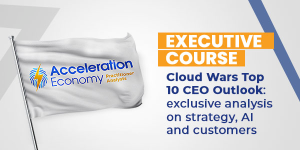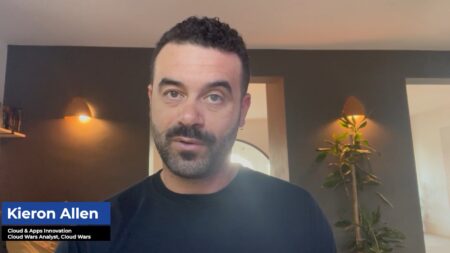
Welcome to this exclusive interview with Safra Catz, CEO of Oracle, as part of the Acceleration Economy Cloud Wars Top 10 CEO Outlook 2024 series. Catz provides insights on Oracle’s infrastructure and applications as well as how the company meets customer needs in a rapidly changing business world.
Gain insight into the way Bob Evans builds and updates the Cloud Wars Top 10 ranking, as well as how C-suite executives use the list to inform strategic cloud purchase decisions. That’s available exclusively through the Acceleration Economy Cloud Wars Top 10 Course.
Highlights
2024 Customer Mindset (01:00)
It’s critical for companies to have their technology investments to be competitive. Customers are looking at some current challenges as opportunities to get ahead, which involves constantly changing and bringing in the best technology, Catz shares. If they’re number one in their market, they look at ways to stay number one. If they’re not number one in their sector, they’re looking to figure out how to get in front by doing things differently and adapting.
“For me personally, I will tell you that spending the time with the customers is my greatest joy because they’ve got problems to solve or challenges or even opportunities…the enthusiasm that comes out from them, it’s very invigorating,” she says.
Oracle’s Positioning to Support Customers (04:40)
The Oracle database is at the beginning of its journey in the cloud with mission-critical applications. Oracle’s horizontal apps — ERP, HCM, and SCM, for instance — are all written from the ground up for the cloud. Oracle also has its vertical offerings.
Ask Cloud Wars AI Agent about this analysis
“Changing quickly has always been considered sort of risky” but what Oracle saw during Covid, Catz explains, was that companies that did not adjust quickly fell behind and couldn’t survive. “Changing fast, actually, isn’t risking…changing slowly can be fatal.” Now, Oracle executives have absorbed this and stay on the lookout for ways to support customers.
Microsoft Partnership (08:33)
Catz describes Oracle’s partnership with Microsoft as a “winning strategy” for its customers. By partnering with other major cloud providers, Oracle customers are able to run Oracle on whichever platforms their customers prefer or may already be using. “The only way to guarantee that is to have the Oracle Cloud in all the other clouds, or connected with them.”
Oracle continues to prioritize these endeavors so customers can choose and have access to a wide range of capabilities.
Meeting New Requirements (10:55)
Oracle takes specific actions to stay current with new requirements in the rapidly changing business world. Catz notes that, as a cloud provider, Oracle has to partner with others openly, because it’s up to the customers how they want to deploy their software. While Oracle provides not only infrastructure but also applications, the company still enables customers to mix and match offerings from other providers.
“We believe the best products and services win…and it’s turning out that way so far,” Catz says.
Customers’ Generative AI (GenAI) Objectives (14:21)
Straightforward use cases include customer support (call avoidance) where the customer spends less and gains productivity. A next-level example is for software companies developing code; much of that work can be repetitive. In medical and healthcare applications, there’s drudgery in doctors writing orders or summarizing clinical meetings, and automation via GenAI can address that. More advanced medical applications include drug discovery and illness detection which will not only save doctors’ time and reduce the cost of healthcare but can actually save lives.

Register for Acceleration Economy’s Cloud Wars CEO Outlook 2024 Course, now available. Featuring exclusive interviews on strategy, AI, and customers with the CEOs of Cloud Wars Top 10 companies.
Oracle’s Healthcare Ambitions (17:41)
Oracle’s healthcare reach is broad; in addition to acquiring Cerner, the company is a leader in clinical trials, infrastructure for genomic analysis, human capital management (HCM) that helps nurses create work schedules, as well as supply chain management for hospitals. The company aims to bring healthcare into the 21st century – to address all the manual work and scenarios where there’s missing information that providers need to ask for; that process is a waste of time and money for the provider and the patient. Electronic records protect privacy more so than having personal data in a manila folder at receptionist’s desk. “I think it’s time we bring it into this century. And we’re not going to quit until we do that end to end.”
Leading Alongside Larry Ellison (20:53)
Catz and Oracle chairman Ellison have been working together for about 25 years and their partnership is “truly a blessing.” Ellison “does not leave you in your comfort zone.” He takes a fresh approach to everything. Some big Oracle competitors decided not to rewrite their application suites for the cloud. Oracle can’t do all that work alone, however. Partnerships are critically important in the cloud; Oracle has to partner with customers and competitors to succeed. That open thinking starts with Ellison.










